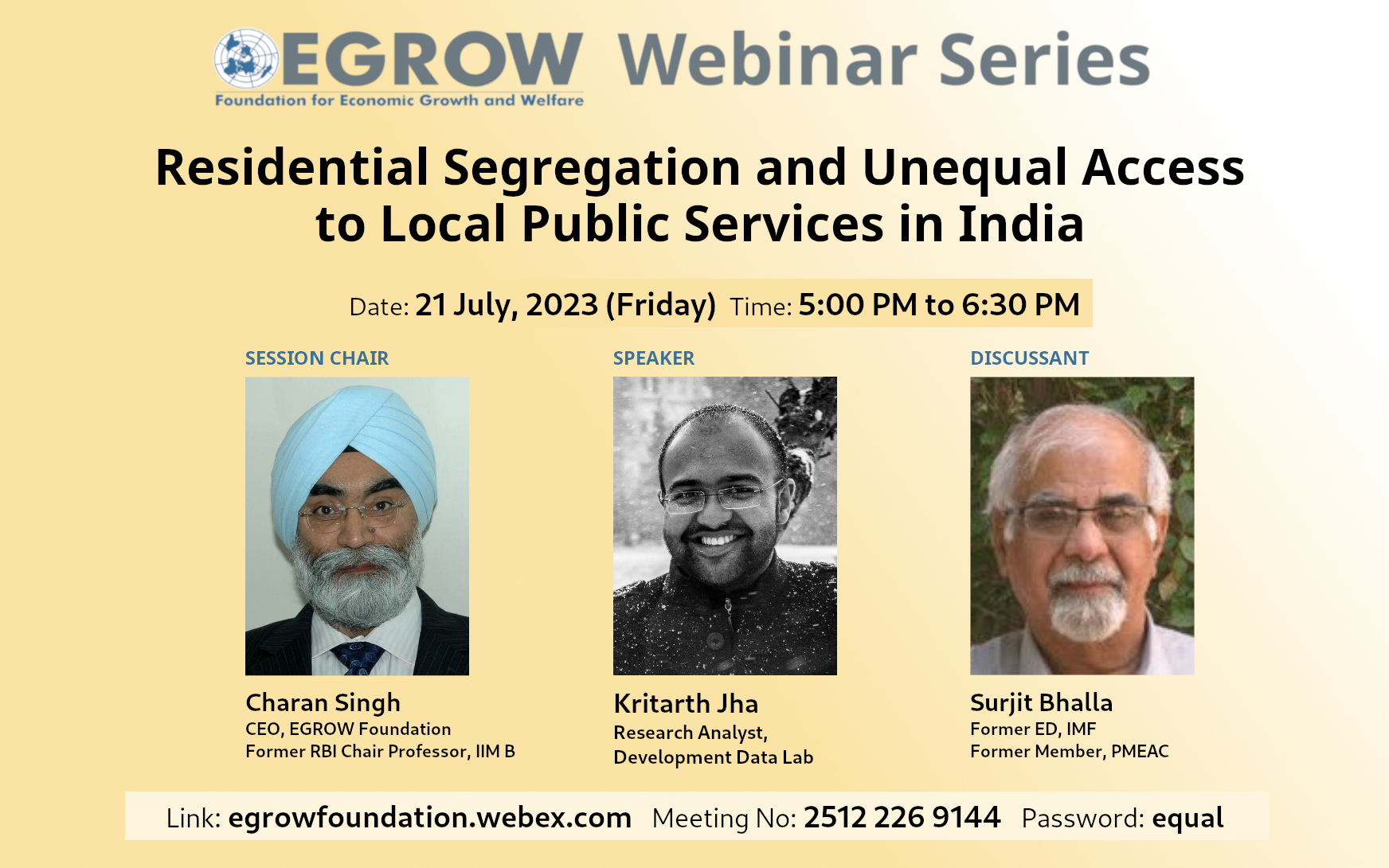Residential Segregation and Unequal Access to Local Public Services in India

Webinar Link
Meeting No: 2512 226 9144
Password: equal
Certificate of Participants
To recieve certificates, please register and attend
Abstract
Residential segregation and unequal access to local public services have emerged as critical challenges in India. The discussion shall explore the relationship between residential segregation and disparities in accessing essential public services at the local level. In India, residential segregation refers to the spatial separation of different social groups based on factors such as caste, religion, and socioeconomic status. This segregation often leads to the formation of disadvantaged communities concentrated in specific areas, while more privileged groups reside in separate neighborhoods. Consequently, this spatial division perpetuates unequal access to local public services. The study employs a multidimensional approach, combining quantitative and qualitative methods to analyze residential segregation patterns and their impact on access to public services across different regions of India. It examines the availability and quality of services such as healthcare, education, water supply, sanitation, and transportation in segregated areas. Findings indicate that residential segregation significantly influences the distribution of public services, exacerbating existing social inequalities. Disadvantaged communities tend to have limited access to quality healthcare facilities, educational institutions, and basic infrastructure. Moreover, the lack of transportation infrastructure in segregated areas restricts mobility and hampers economic opportunities for marginalized groups. Understanding the dynamics of residential segregation and its implications for unequal access to public services is crucial for policymakers and urban planners to formulate effective strategies for inclusive development. Addressing these disparities requires targeted interventions, such as investment in infrastructure, provision of equal opportunities, and the implementation of affirmative action policies to ensure equitable access to public services for all residents, regardless of their social background or place of residence. By fostering integration and reducing residential segregation, India can strive towards a more inclusive and equitable society.
About the Speakers
Charan Singh
Dr. Charan Singh is the CEO and Founder Director, EGROW Foundation. He is also the Non-Executive Chairman of Punjab & Sind Bank. Earlier, he was the RBI Chair Professor of Economics at the prestigious Indian Institute of Management Bangalore, India; Senior Economist at the IMF, Washington DC; and Research Director (Economic Policy, Debt Management) at the RBI. Among other positions, Dr Singh served on the Board of NHB and NABFINS.
Dr Singh has published extensively and has two books to his credit.
Dr Singh completed M.Phil.in Applied Economics from.JNU, Delhi and PhD in Economics from the University of New South Wales, Sydney in 1997. He followed it up with post-doctoral studies at Department of Economics, Harvard University from Aug 2003 to Aug 2004 and SCID, Stanford University from August 2004 to Jan 2006.
Kritarth Jha
Kritarth Jha is currently working as a Research Analyst at Development Data Lab since March 2020. Prior to this, he held various positions at J-PAL South Asia, including Research Associate from January 2019 to August 2020 and Consultant from March 2020 to August 2020.
Kritarth's project titles include "Improving skills in Bihar: how to reduce drop-out rates from training programs?" and "Getting rural workers into Urban Jobs: Evidence from a training and placement program in India". In May 2015, Kritarth interned at the Deutsche Bank Centre in Mumbai.
He holds an MPhil in Economics from the University of Cambridge, where he was honored with the prestigious Cambridge Trust Scholarship, specifically the Peter Kishor Chand Anand Cambridge Scholarship. During his undergraduate studies at the Indian Institute of Technology Kharagpur, Kritarth received the Institute Silver Medal for achieving the highest CGPA in his class. His research contributions include a publication titled "Scaling behaviour of Treasury rates in India," co-authored with Gourishankar S. Hiremath and Ankur Agarwal, which appeared in the journal Macroeconomics and Finance in Emerging Market Economies (2019, Vol. 12, No. 1, pp. 1-23).
Kritarth Jha is a skilled professional with expertise in automation and analysis using R, Stata, Python, and Matlab. Proficient in Survey CTO and LaTeX.
Kritarth Jha is an accomplished scholar with a multidisciplinary educational background. He holds an MPhil in Economics Research from the University of Cambridge, as well as an Advanced Diploma in Economics from the same institution. He also completed his B.Tech in Biotechnology and Biochemical Engineering at the Indian Institute of Technology, Kharagpur.
Surjit Bhalla
Dr. S.S. Bhalla, is a Senior India Analyst for the Observatory Group, a New York based macroeconomic policy advisory firm and Chairman of Oxus Research & Investments. In 2017, he was appointed as Member of the Prime Minister’s Economic Advisory Council. He has been a member of the Secondary Markets Advisory Committee of SEBI and the National Statistical Commission of India. Dr Bhalla writes extensively on economic issues and has recently authored another book titled, The New Wealth of Nations.